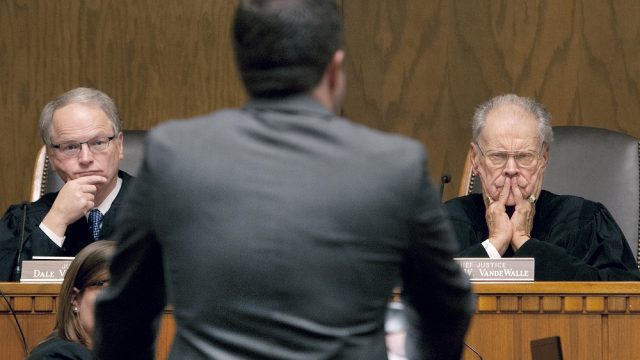North Dakota Supreme Court: It’s Ok if Cops Make Errors About Facts and Law as Long as They’re “Reasonable”

North Dakota Supreme Court Chief Justice Gearld VandeWalle (right) and Justice Dale Sandstrom (left) listen to oral arguemennts Tuesday Oct. 30, 2012 in the Baker Courtroom at the Unicersity of North Dakota Law School.JOHN SETNNES
Yesterday the North Dakota Supreme Court handed down decisions in two cases – State v. Phelps and State v. Hirschkorn – involving crimes based on evidenced obtained by police officers during improper traffic stops.
At issue is an oddity in North Dakota law, which is that blinkers don’t have to be used when making a turn from an alley. In both the aforementioned cases evidence was obtained from the defendants during traffic stops that resulted from the failure to use a blinker when exiting an alley. The district court in each case suppressed the evidence after finding that the traffic stop was improper.
Here’s a summary from the Hirschkorn case:

It is absurd that the law, which apparently requires the use of a turn signal in every other traffic situation, for some reason does not have that requirement for turning out of an alley. Seems like a loophole to me. An anachronism. I can’t blame the law enforcement officers who pulled over Hirschkorn and Phelps for believing they had made proper traffic stops.
But the law is the law, right? If it’s not illegal to turn from an alley without signaling then the defendants in these cases shouldn’t have been stopped. Thus the evidence obtained in an improper stop, even if the cops thought it was a proper stop, should be suppressed.
Except the state Supreme Court – relying on U.S. Supreme Court precedent set in 2014 – says it doesn’t matter if the stops were proper or not as long as the cops thought they were making a proper stop. Another excerpt from Hirschkorn, citing the SCOTUS decision I linked above:

So it’s ok if cops make a mistake about fact or law, as long as the mistake is reasonable. And who decides if a given mistake is reasonable? The courts, which fairly consistently side with ever-expanding police power.
It’s worth noting that the state Supreme Court also disagreed with the lower court on the status of the alley, concluding that the alley wasn’t an alley at all but a roadway upon which signalling is required. But that’s beside the point. The state Supreme Court didn’t stop at overturning the lower court because they disagreed on the definition of what an alley is. They went further and concluded that it doesn’t matter if a cop makes an improper stop as long as the mistake was reasonable.
Decisions like these, I think, embolden cops to stop everyone whether the stop is warranted or not. After all, mistakes are ok, as long as they’re reasonable mistakes.
The 4th amendment’s protections are greatly diminished by rulings like these, I think.
And there is a question here of double standards, too. We citizens rarely get such latitude for error under the law. Can you imagine telling the IRS not to fine you because your error in complying with our byzantine tax code was reasonable? I don’t think you’d get far with that argument.
The law is the law, and ought to be enforced vigorously as written. If the law is too complex for cops or citizens to comply with, then the solution should come from legislators not judges.




